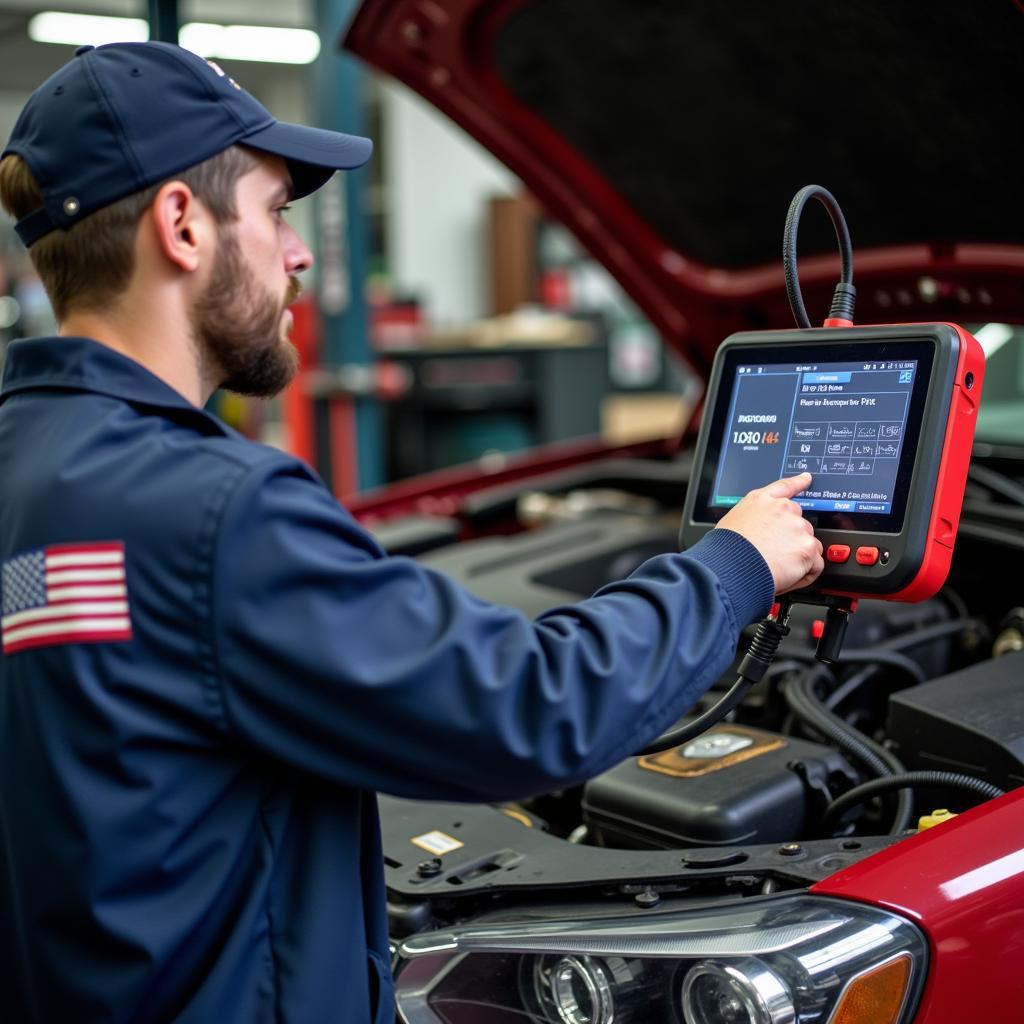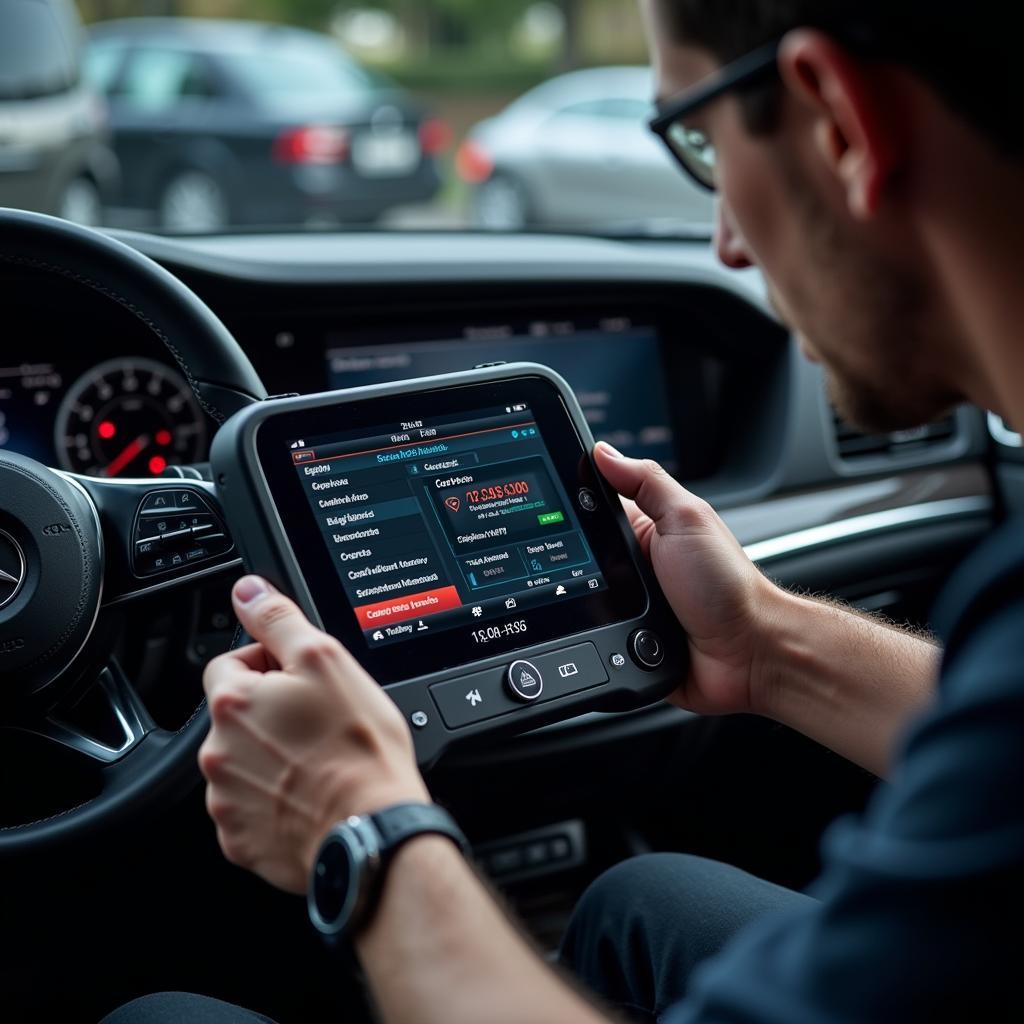Finding the Best Pc Diagnostics Tool can feel like navigating a maze, especially with the abundance of options available today. Whether you’re a seasoned mechanic or a car enthusiast, having a reliable diagnostic tool is no longer a luxury but a necessity. These tools act as your eyes and ears into the complex world of your car’s computer system, allowing you to pinpoint issues, understand error codes, and even perform some repairs yourself.
[image-1|pc-diagnostics-tool-in-action|Mechanic using a PC diagnostics tool|A mechanic in a bustling auto repair shop leans over the open hood of a sleek modern car, intently connecting a PC diagnostics tool to the vehicle’s OBD-II port. The laptop screen beside him displays a colorful interface, showcasing real-time data and diagnostics information being retrieved from the car’s computer system.]
Why You Need a PC Diagnostics Tool
Modern vehicles are essentially computers on wheels, equipped with sophisticated Electronic Control Units (ECUs) that manage everything from engine performance to safety features. When a problem arises, these ECUs generate diagnostic trouble codes (DTCs) that provide clues about the underlying issue.
Here’s where a PC diagnostics tool becomes invaluable:
- Read and Clear DTCs: Easily identify the source of a check engine light or other warning indicators.
- View Live Data: Monitor various engine parameters like RPM, temperature, and oxygen sensor readings in real time.
- Perform Actuator Tests: Activate components like fuel injectors, solenoids, or ABS modules to verify their operation.
- Reset Service Lights: After performing maintenance, reset service reminders like oil change or brake pad warnings.
[image-2|different-types-of-pc-diagnostics-tools|Various PC diagnostics tools displayed on a workbench| A well-organized workbench in an auto repair shop, showcasing an assortment of PC diagnostics tools. This includes a laptop displaying diagnostic software, a handheld scan tool, a Bluetooth OBD-II adapter connected to a tablet, and various cables and adapters commonly used in automotive diagnostics.]
Choosing the Right PC Diagnostics Tool: Factors to Consider
Navigating the world of PC diagnostics tools can be daunting. Consider these key factors before making your purchase:
- Vehicle Compatibility: Ensure the tool supports your car’s make, model, and year. Some tools are universal, while others cater to specific brands like the bmw specific diagnostic tool.
- Software Features: Basic code readers provide DTCs, while advanced tools offer live data, graphing, and special functions like key programming.
- User Interface: Look for intuitive software with clear menus and easy navigation.
- Updates: Regular software updates are crucial to ensure compatibility with new vehicle models and features.
- Budget: Prices vary widely, so determine your needs and budget before exploring options.
[image-3|mechanic-explaining-diagnostics-to-customer|Mechanic explaining diagnostic results to a car owner|A friendly and knowledgeable mechanic stands beside a car owner, pointing to the screen of a laptop displaying the results of a diagnostic scan. The mechanic patiently explains the identified issues and the recommended course of action, ensuring the customer understands the situation clearly.]
Top Features of the Best PC Diagnostics Tools
While specific features vary, the best PC diagnostics tools share these commonalities:
- Comprehensive Coverage: Support for a wide range of vehicle makes and models, including both domestic and import brands.
- Advanced Diagnostics: Go beyond basic code reading to offer live data streaming, bi-directional controls, and special functions.
- User-Friendly Interface: Intuitive software with easy-to-understand menus and data presentation.
- Regular Updates: Frequent software updates to ensure compatibility with the latest vehicle models and features.
- Data Logging and Reporting: Ability to record, save, and export diagnostic data for further analysis or sharing.
“Investing in a quality PC diagnostics tool is essential for any serious DIY mechanic. It’s like having an X-ray vision into your car’s health, empowering you to make informed decisions about repairs,” says Jake Carter, a seasoned automotive engineer with over 15 years of experience.
Beyond the Basics: Advanced Capabilities
Professional-grade PC diagnostics tools often include:
- ECU Coding and Programming: Modify ECU parameters for performance tuning, feature activation, or software updates.
- Key Programming: Add new keys, replace lost keys, or program remote keyless entry systems.
- Module Reset and Adaptation: Reset or relearn electronic modules after repair or replacement.
It’s important to note that these advanced features require specialized knowledge and should be performed with caution.
Making the Right Choice
Ultimately, the best PC diagnostics tool for you depends on your individual needs and expertise.
- DIY Enthusiasts: Tools like the ckd initial diagnostic tool or the wd diagnostic tool usb offer a great balance between affordability and functionality. They’re perfect for reading and clearing codes, viewing live data, and performing basic diagnostics.
- Professional Mechanics: High-end tools with comprehensive coverage, advanced features, and regular updates are essential for professional use.
“Remember, a PC diagnostics tool is only as good as the person using it. Invest time in understanding your tool’s capabilities and limitations. When in doubt, consult a qualified mechanic,” advises Jake.
Conclusion
A reliable PC diagnostics tool is an indispensable asset for any car owner or mechanic. By empowering you with the knowledge to understand and address your car’s needs, these tools can save you time, money, and frustration.
Need help choosing the right PC diagnostics tool for your needs? Contact ScanToolUS at +1 (641) 206-8880 or visit our office at 1615 S Laramie Ave, Cicero, IL 60804, USA. Our team of experts is ready to assist you!


